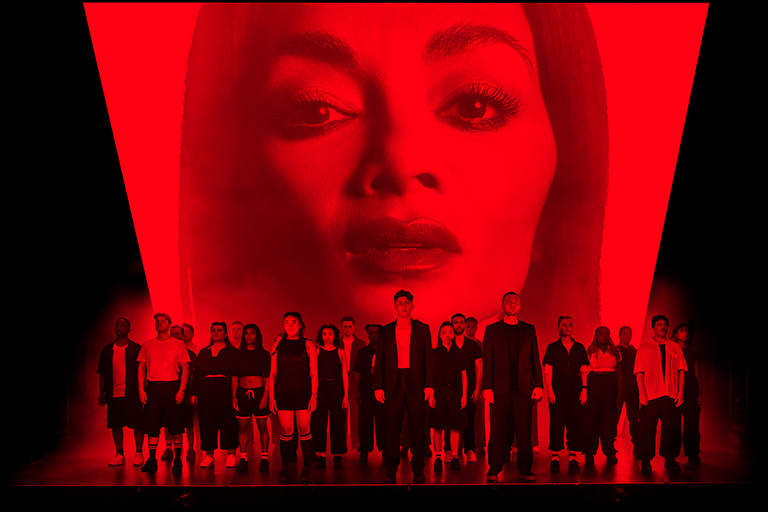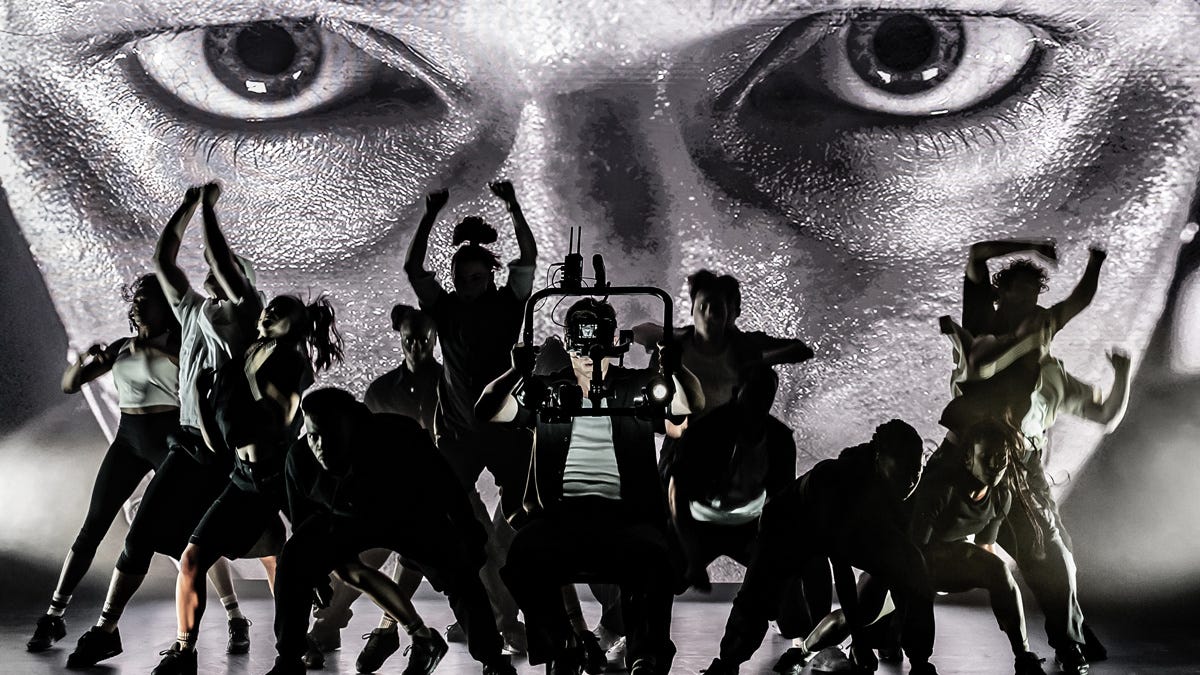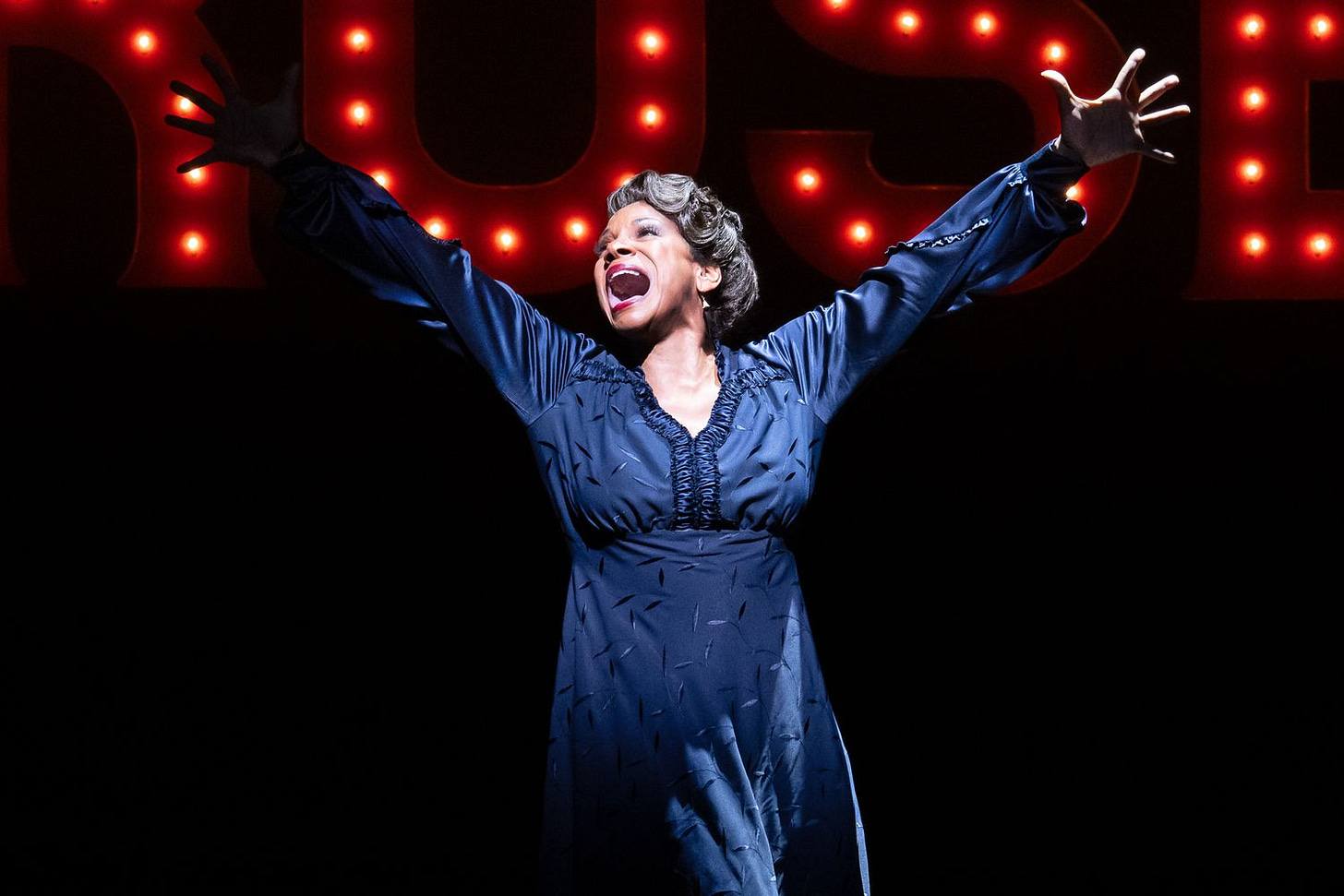I love a book about publishing, I love a movie about movies, and I love a show about show business. Interestingly, both Sunset Boulevard and Gypsy are exactly that.
Months ago, I was moseying through my least favorite part of the city (44th St) and was struck with an intense vision. This was a literal and a mental vision: first, I looked up and saw that the marquees for Sunset Boulevard and Gypsy were across the street from each other. Then I realized that I had it within my power to see these two shows back to back. I already had tickets to Gypsy, and I had a gift card so I could get tickets to Sunset Boulevard. So I did.
You may be wondering why I wanted to see these shows together. The answer is simple; Norma Desmond and Mama Rose are two of the most iconic roles a musical theater diva can play. And I wanted to be able to make an early prediction about which one is winning the Tony.
Here she is, boys. Here she is, world. Enjoy.

Theater: Sunset Boulevard, Gypsy
I hate melodrama, but I like camp. I don’t like when things are self serious, but I don’t mind serious things. I don’t have much interest in Andrew Lloyd Webber, but Cats the Jellicle Ball at the PAC at the World Trade Center was the best show I saw in 2024. I love to see powerhouse vocalists, but my opinion of a powerhouse vocalist is altered by Instagram comments asking “where do I get this hat?!!!1”
Going into Jamie Lloyd’s stripped down revival of Sunset Boulevard, and I was as open minded as I could be. And then, for 3 hours, I sat in the St. James Theater’s high high balcony and got progressively more and more frustrated. I couldn’t quite tell why, but later, sitting on the ground at JFK Airport, it finally came to me: despite its sleek appearance, Sunset Blvd is basically a gothic horror. And I’ve never liked gothic horror2.
Based on a 1950 film, Sunset Blvd follows Joe Gillis (Tom Francis), a down-on-his-luck screenwriter who stumbles upon the crumbling mansion of the (mentally crumbling) former silent film star, Norma Desmond (Nicole Scherzinger). Like any good gothic leading lady, Norma is an obsessive recluse, her only company a thuggish British butler, the corpse of a dead chimpanzee, and the fervent belief that she’s still film’s finest starlet (“I am big. It's the pictures that got small”). She’s immediately taken with Joe, who is young, hot, and agreeable. Desperate to make her return to the screen, Norma convinces Joe to read her screenplay about Salome and work on it with her. Desperate for money, Joe says yes.
Narrating to the audience, Joe explains that Norma’s screenplay is objectively batshit, that Norma is objectively batshit (like we couldn’t tell for ourselves), but that he’s quite happy to take advantage of her and her home. Joe begins to sleep with Norma, while also developing feelings for a young editor, Betty (Grace Hodgett Young, fighting for an American accent). If you’ve seen the photos of Scherzinger and Francis at the curtain call, covered in blood, you can guess what happens next: Norma finds about about Betty, gets jealous and reader, she murders poor Joe.
This unsettling story is accompanied by Webber’s most indulgent, melodramatic music. Which, to be fair, is sweeping and majestic, is cinematic, and does makes total sense for the show’s setting and vibe. And the few ensemble numbers are enjoyable; I actually think the fact that no actor beyond the leads is taking anything seriously is part of the show’s charm. But as much as Scherzinger is committing to the role, as much as she is putting on that dress, grabbing that camera, and going crazy, there are just far too many over the top ‘Memory’-like solo numbers and they are really weird. An Andrew Lloyd Webber fan will be fed — I was wincing.

However, like Zhailon Levingston and Bill Rauch’s work on Cats, Jamie Lloyd has a keen directorial vision, and that vision is good. While previous productions of Sunset Blvd have featured grand staircases and grim mansions, Lloyd’s set is stark, save for an LCD screen that folds down from the stage’s ceiling, 23 ft tall and nearly twice as wide. It’s easy to call an empty stage lazy, but Sunset Blvd’s screen and its use probably constitutes the greatest technological marvel I’ve ever seen at the theater.
In a collaborative feat from Lloyd, cinematographers Nathan Amzi and Joe Ransom, and principle camera op/ensemble member Shayna McPherson, Sunset Blvd blurs the lines between theater and film, taking Norma and her captive audience to the movies. Throughout the show, onstage and off, the actors are filmed and projected live onto the screen. There is no real delay between the the action onstage and the video feed, and as far as I can tell, there is no back up footage if the video goes down — this is live theater at its most alive.
Lloyd utilizes videography to great effect: showing that Norma’s whole life is a performance, bringing car chases to the stage in new ways, and proving that though Scherzinger may be a little too young (she’s 46) and too pretty to play Norma, the character is made grotesque by her obsessive need to be on the screen. However, the show’s finest (and most viral) moment belongs not to Norma, but to Tom Francis and Joe. At the start of the second act, McPherson and her camera bring us to Francis’ dressing room, where he isn’t quite in character yet. In a nice moment of levity, and a stunning case for the return of entr’actes in musicals, Francis walks us through the St. James’ dressing rooms, each with a different ALW easter egg. He winds his way down the (again, very tall) building’s stairwell, finally beginning the show’s title song as he nears the bottom. But where one might expect him to head onstage, Francis instead pushes his way outside onto 44th street. The orchestra is still playing, Francis is still singing (perfectly in time), McPherson is still following, her camera still beaming him onto the screen, and for want of a better word, it’s really fucking cool. The New York Times has a deep dive into how it works, but I’m still not sure how it happens, how they make sure it works every night. All I know is that despite watching the Olivier performance of the same number, despite seeing countless TikToks of Francis in Shubert Alley, I was on the edge of my seat. It’s movie magic and theater magic and an absolute star turn for Francis, who commands the stage (and screen).
While Sunset Boulevard the musical may not be to my taste, Sunset Boulevard the production is, “Sunset Boulevard” the song alone is worth the cost of admission, and I think we have a rightful Best Revival winner at the 78th annual Tony Awards.

Now Best Actress… I think it very well could go to six time winner Audra Ann McDonald. Like, why not make it seven?
I confess that I did not engage much with Gypsy before seeing it onstage (my Laura Benanti vocal catalogue deep dive nonwithstanding3). That said, even going in, I understood it to be The Great American Musical, the seminal Book Musical4. What I didn’t quite grasp in advance was that it is also a Great American Saga onstage. Based on the memoirs of striptease performer, Gypsy Rose Lee, Gyspy follows Rose (Audra McDonald), a 1920s mother who is convinced that her young daughter June (Jordan Tyson) is destined to be a star. Pulling in a group of young boys, and her older daughter, Louise (Joy Woods), Rose builds an act around June, and begins touring it through the vaudeville circuit(s) of the West Coast. That the act is not very good is irrelevant — June is good, and Rose has a dream, one she has no intention of letting go of. The children grow, the act does not. June leaves, Rose pivots her attention to Louise. Vaudeville dries up, Rose has Louise performing at a burlesque club. And when Louise finally finds stardom, it is as a stripper, not an actress.
Although director George C. Wolfe’s vision for this revival is not as aesthetically daring as Lloyd’s work in Sunset Blvd, it is still striking. In the many high profile productions of Gypsy over the years, Mama Rose has always been played by a white woman — by newly centering a Black mother and her daughters, Wolfe recontextualizes the show beautifully. Rose’s struggle to get her act on to the Orpheum Circuit is enhanced by the fact that historically, vaudeville halls would only book a single Black act a night (source!). Her desperation, her choice to center her more white-passing daughter, her replacement of the act’s young Black dancers with white men becomes all the more strategic and tragic and impactful. Rose isn’t a monster, she’s a mother advocating for her children, sometimes cruelly, certainly obsessively, but always lovingly.
Visually and scenically, there is little more going on in the show than in Sunset Blvd. Gypsy is the first show at the Majestic Theater since Phantom of the Opera concluded its 35 year run, and it feels lackluster and struggles to take up the space at times — it’s hard to fill a stage that big with a musical that largely features only three or four actors on stage at a time. However, in the bigger moments, and the dance numbers, it works. Choreographer Camille A. Brown doesn’t get many opportunities to show off, but a tap number early on is kinetic and fun, and her work on “All I Need is the Girl” had me wondering if she and performer Kevin Csolak might be the team needed to finally bring Singin in the Rain back to the stage5.
I’ll confess, I might be biased against Nicole Scherzinger, because while I was at Sunset Boulevard for the camera work, I was at Gypsy for Audra. She is a revelation in the role (I believe the technical phrase is “she’s acting and singing her face off”). Although Rose is typically sung by more of an alto/belter, there’s a stunning richness in McDonald’s voice that’s true to every Mama Rose who came before. And the fact that McDonald is a soprano, that she has a beautiful high vibrato, makes you even wonder more if Rose could have been a star, in her own right. Because McDonald is the most beautiful of sopranos and she’s not (just) belting, her Rose isn’t just righteously angry like Patti LuPone’s, but grief-stricken. And it doesn’t hurt that Gypsy is a musically delicious to begin with, with toe tappers like “You Gotta Get a Gimmick” and “If Momma Was Married” alongside the iconic “Everything’s Coming Up Roses” and “Rose’s Turn.”
There’s a richness too to Woods and Tyson’s performances that blasts to the back of the Majestic and is a marvel to witness. Jordan Tyson’s “Dainty” June is anything but, high energy and vicious like she could cartwheel across the stage then sing you into an early grave. As Louise, Joy Woods is first subtly devastating, later a beautifully confident dancer, and finally the sultry stripper Gypsy Rose Lee. Louise requires a true triple threat for just “The Strip/Let Me Entertain You” alone; she starts the song terrified and heartbroken, and by halfway through she’s performing a Josephine Baker inspired strip with ease. It’s exciting to see young (lol ie my age - Woods and Tom Francis are younger than me, Tyson is probably also 26) actors charm the audience in real time and become stars. Surprisingly, both Gypsy and Sunset Boulevard provide the perfect vehicles for it, and what a joy (ha) it is to witness.
Norma Desmond and Mama Rose desperately want their names in lights and have no moral qualms about how to reach the top. They seduce, they manipulate, and they demand attention. Scherzinger and Norma seem to have left this plane of existence or perhaps been possessed, bringing a creepy, sexy physicality to the role. McDonald’s Mama Rose feels more grounded, but with an urgency and hunger that Scherzinger lacks.
It’s the greatest star against the ultimate stage mother, both the superlatives of their respective tropes. But while both of them are compelling, captivating, and I have no real clue which way Tony voters will swing, it’s McDonald who felt real and tangible to me; Scherzinger a ghost, a vengeful spirit, a contortionist. And I like spectacle and I like ghosts but sometimes the theater magic that grabs you most is a woman alone on a too-big stage asking each and every audience member to give her a turn in the spotlight.
It was a shock to me to find out Nicole was a Tr*mp supporter, not because she’s a part of the Broadway community and most theater people (Laura Osnes and Katherine McPhee excluded) are pretty liberal, but rather, because I simply had it in my head that that woman was British (all I knew was she started One Direction and sang Phantom of the Opera with 4 phantoms at the Oliviers!)
I’ve hated gothic horror ever since I read The Thief of Always in 7th grade for Mr. Key’s gifted English class (shout out to Mr. Key). Creepy book.
Have you heard that she’s a coloratura soprano and so am I? RESEARCH, baby!!
To my friends and the chat we had a few weeks ago, I say that 1. Cabaret is not structured like a typical book musical, it is literally a cabaret, 2. Gypsy’s influence on musical theater as a genre is massive!! 3. Take it up with Ben Brantley, Frank Rich and Clive Barnes.
Like idk, what if it starred Csolak, Mike Faist and Joy Woods, and was directed and choreographed by Brown? I’m onto something…




